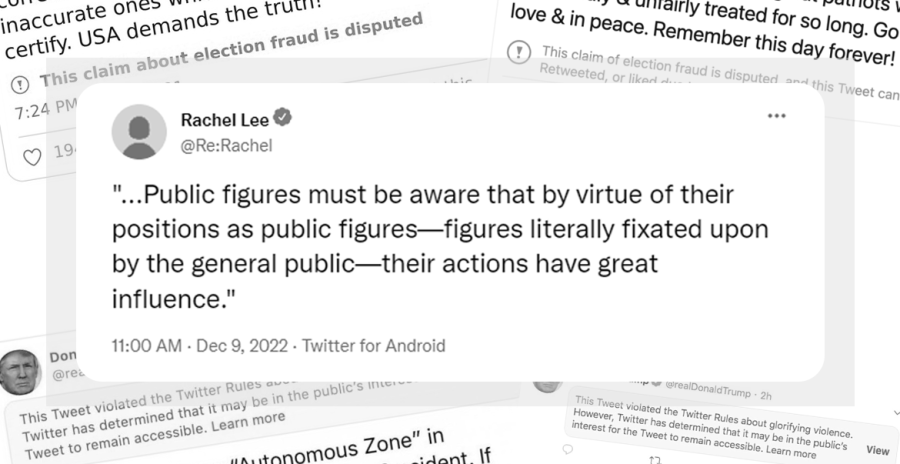Public safety in public speech
One of the United States’ most definitive characteristics, the capability of American citizens to exercise their freedom of speech, has been upheld for more than 230 years.
Unfortunately, as free will dictates, there exist many who have abused the power of the First Amendment, even as it has not been without certain boundaries, as it was decided in the landmark 1919 Schenck v. United States ruling that Congress has a right to restrict speech that poses a “clear and present danger” to the country.
Most famously, this ruling was explained with the argument that a person raising the fire alarm in a building with no fire should not be protected under the First Amendment. However, certain public officials have been known to raise similar alarms, which, while not as physical as a real fire, have been no less dangerous.
Namely, the raising of alarm among American citizens regarding the 2020 election forms the basis for the lengthy impeachment trial brought against former President Donald Trump for the Jan. 6 insurrection, just one of Trump’s many offenses as Commander-in-Chief.
In fact, the most egregious and widely remembered of his habits as the head of state must be his propensity for blatantly lying to the public, setting an extremely dangerous precedent for years of politicians to come.
But Trump’s failings as chief executive set an example for a situation that has become all too clear in contemporary society. While “fact checking” is a trend that spikes in popularity with every election season, it wasn’t until close to November of 2016 that the term “fake news” saw an astronomical increase over time, according to Google Trends.
The idea that the president of one of the world’s strongest nations has the power to just lie about topics as crucial to the public as a world-wide pandemic or a national election leaves the American people as susceptible to falsehoods as they would have been if they sourced all their news from social media platforms.
It also just so happened that turning to Trump’s Twitter handle for guidance during his presidency would reveal him making wild declarations about the efficacy of hydroxychloroquine, a drug widely unproven to treat COVID-19, to aid his own recovery from COVID-19.
His heavy endorsements of hydroxychloroquine resulted in spiking demand, which not only created shortages in supply for individuals reliant on the medication such as lupus patients, but also caused overdoses in individuals who self-medicated themselves with Trump’s reported wonder drug.
All this goes to show that when public figures do not make statements that are properly informed, the victims of their rhetoric are often widespread and undeserving.
In further examples, one only needs to look to the violent treatment of Asian Americans in recent years following Trump’s tweets about COVID-19 as the “China virus”.
His sinophobic rhetoric fueled a drastic increase in anti-Asian hate crime, with reports from the Center for the Study of Hate and Extremism noting a 260.5% increase in anti-Asian hate crime in major American cities over a single year time period.
Or, for a non-Trump example, take William Thompson, senior scientist at the CDC and “whistleblower”. His discussions with bioengineer Brian Hooker inspired Hooker to release unreliable data to the public “proving” that vaccines cause autism, greatly furthering the anti-vaccine movement.
In both cases, the abuse of power by figures in positions of social or political power resulted in the injury, and even death, of thousands of people.
Arguably less permanent in consequence, but no less severe in offense, would also include the actions of entrepreneur Elon Musk, whose own behavior encouraged racist behavior in Tesla’s marketing department and author J.K Rowling, who is infamous for spreading transphobic sentiment.
Especially with the prevalence of social media platforms like Instagram or Twitter, which allow people to communicate with millions of people at once, public figures must be aware that by virtue of their positions as public figures—figures literally fixated upon by the general public—their actions have great influence.
In the first place, there is only so much scrutiny on those in the public eye because of their status as role models and representatives for the common masses. Celebrity endorsements only work because of the power behind the name brand of someone well-known.
On the other hand, it may be that the general public should also take more care to ensure that they are not completely putting their faith into everything that they see, and should take proper caution in selecting their daily news sources.
Nevertheless, it is still the duty of public figures to take heed of whatever information they pass on to the people as their great power often lends itself to the corresponding great responsibility.
Your donation will support the student journalists of Diamond Bar High School. Your contribution will allow us to purchase equipment and cover our annual website hosting costs.









